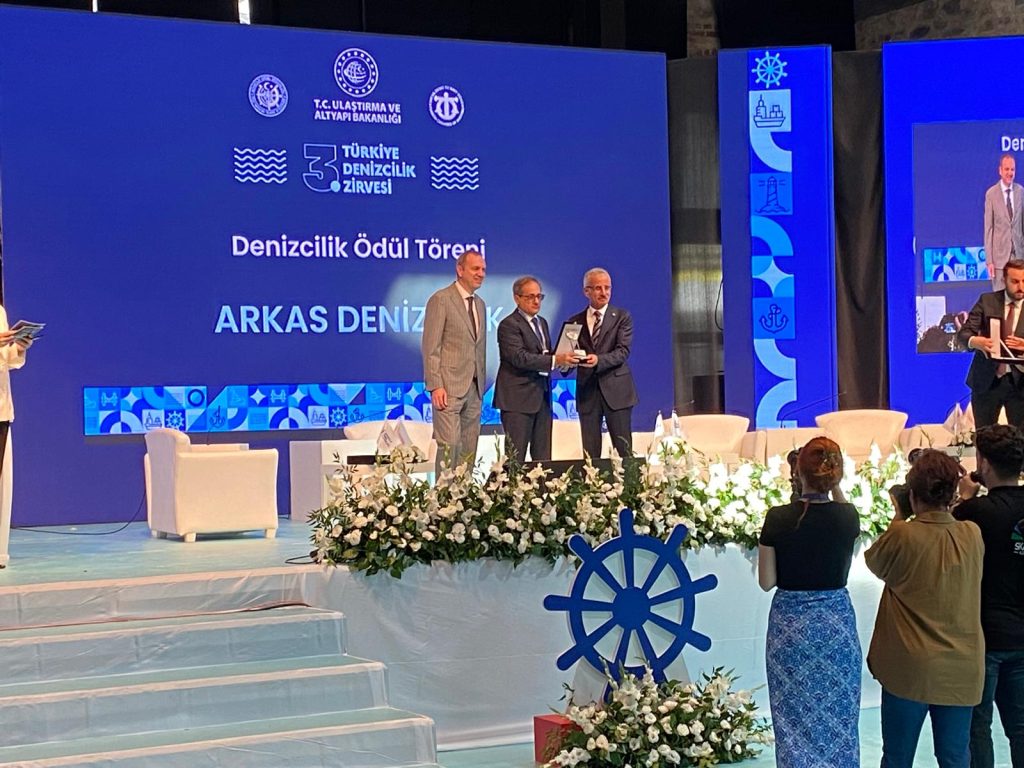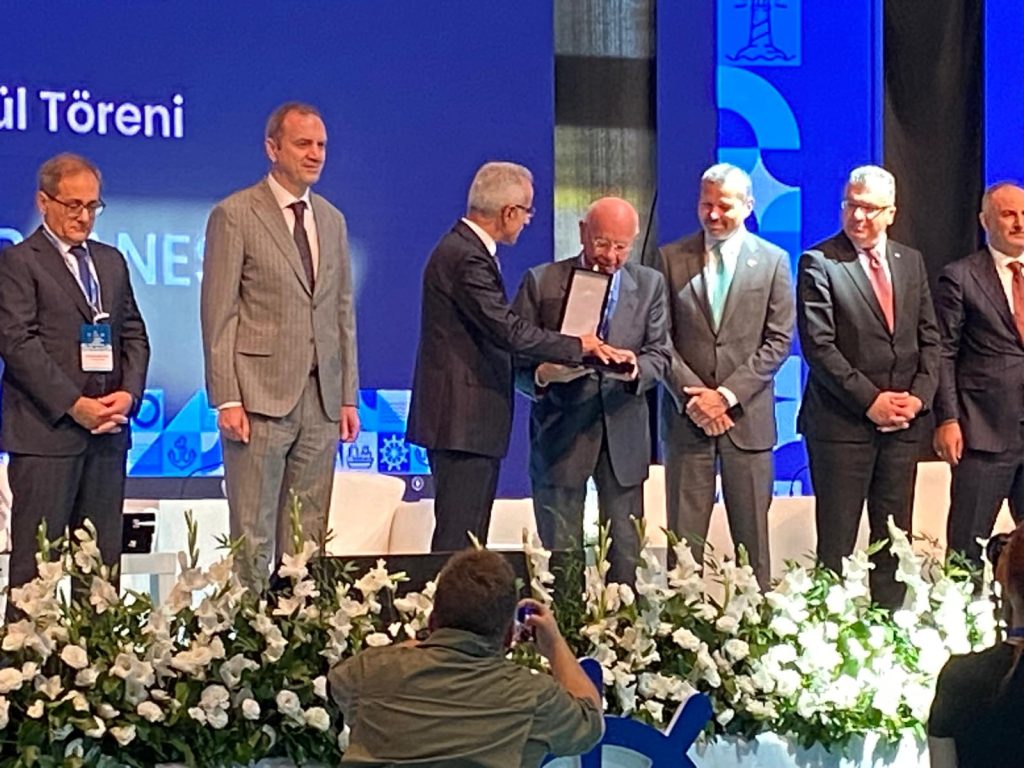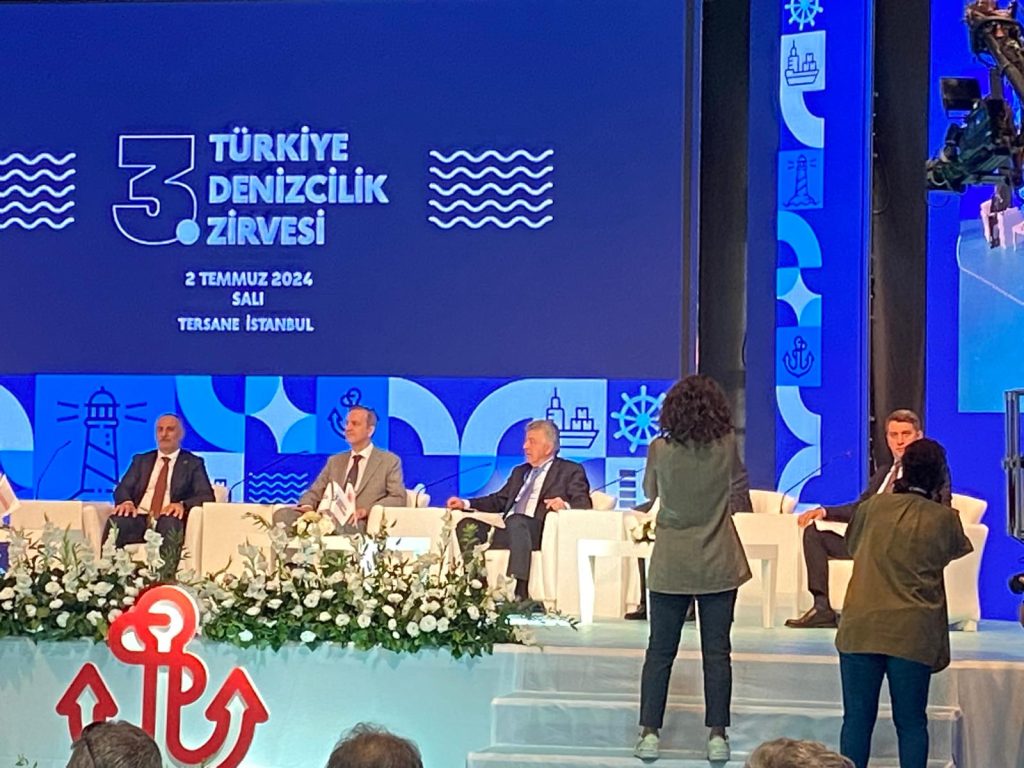

Our Chairman, Cihan Ergenç, highlighted the importance of the Tonnage Tax System in competing within the global maritime industry.
This year’s 3rd Maritime Summit also provided a perspective on current issues and the future of maritime transport, with discussions led by experts in the field.
The opening speeches of the event were delivered by the Minister of Transport and Infrastructure Abdulkadir Uraloğlu, IMO Secretary-General Arsenio Antonio Dominguez Velasco, Director General of Maritime Affairs Ünal Baylan, and IMEAK DTO Chairman of the Board Tamer Kıran.
Following the opening speeches, the Maritime Awards were presented. ARKAS Shipping was honored as the company with the highest number of Turkish-flagged vessels and the company employing the most Turkish seafarers.

Additionally, the Maritime Award was presented to Mr. Eşref Cerrahoğlu, a former board member who has made significant contributions to our sector with his vision and continues to do so.

After the awards ceremony, the first panel titled “Overview of the Turkish International Ship Registry under the Dominance of Flags of Convenience” was held. In this panel, our Chairman Cihan Ergenç participated as a panelist along with other panelists, including the Director General of Maritime Affairs Ünal Baylan, IMEAK DTO Chairman of the Board Tamer Kıran, TAIS Chairman of the Board Ali İbrahim Kontaytekin, and DİTAŞ General Manager and our member Hakan Karaca. The panel was moderated by Dr. Özkan Poyraz.
During the panel, our chairman stated:
Cihan Ergenç’s Speech:
“In history, maritime has seen various accelerations, one of which is the Turkish International Ship Registry (TUGS). This act, which has long provided significant support to Turkish maritime, is no longer able to maintain its previous momentum. However, I still support TUGS. On the other hand, while continuing to advocate for issues I have supported for 15 years, Turkish Maritime Transport is beginning to fall behind in the international arena.
Flags of convenience are a global reality. As the world moves in this direction, and while the EU and OECD accept certain realities, the fleet under TUGS has decreased from 15 million DWT to 6 million DWT today. Meanwhile, the fleet of Turkish-owned ships has reached 42-44 million DWT.

We should follow what the world is doing. All EU countries, as well as Singapore, China, Malta, and Japan, have the Tonnage Tax System. Greece has been implementing this system since 1975. Whether it is the Dutch model, the Greek model, or the English model—particularly the 24th update of the English tonnage tax system, which I find most suitable—we should examine these systems and create a tonnage tax model that our ministry deems appropriate. I believe we have no other alternative. We have deep-rooted issues that we haven’t been able to change for over 15 years. We can solve many of these problems this way. We are engaged in international business and have international rules. I have a ship in Australia right now, operating very cleanly. Another ship of mine is in the US.
All we want is equal competition conditions. We are not saying we should not pay taxes; of course, we will pay taxes. Let’s do what the world does. Otherwise, we won’t be able to compete. Under TUGS, we now hoist our flag aft flag staff; we want to place it at the foremast. We should regulate this by a new act. There are banking issues, exchange rate issues, tax issues, profit distribution issues—various challenges.
Today, Turkish maritime needs a new vision. I believe we can only achieve this vision with the Tonnage Tax System. Some things, like TUGS, have completed their mission. I would love to raise those standards willingly, but I think it is difficult to solve this with the current laws and constitution. We have issues we work on with seven ministries. We are obliged to pass the same law through 3-4 ministries, which is not easy. Unfortunately, we cannot overcome these problems. We see the tonnage tax system as a solution in the maritime transport ecosystem. I believe this system could bring in 20-25 billion USD annually in foreign exchange to Turkey, add 700-800 million USD in indirect taxes, and more importantly, with a good system, place Istanbul and Turkey among the top five global maritime centers. With our strategic advantage due to our geographical location, we can achieve a new success like Turkish Airlines.
I continue to express my beliefs with patience.”
Following this, the moderator Dr. Özkan Poyraz asked TAIS Chairman and Vice Chairman of the Turkish Shipowners’ Association Ali İbrahim Kontaytekin to conduct a cost-benefit analysis of the Turkish International Ship Registry, looking from the perspective of seafarers and insurance regulations.
Ali İbrahim Kontaytekin stated:
“Two years ago, a summit was held, and since then, we have not made any progress as shipowners. On the contrary, an additional problem has emerged. I am talking about TUGS and the second registry. In the end, we have been discussing the same issues for two years, but no progress is being made. Looking at the world, it is in turmoil; the world is talking about emissions, whether to send ships to be scrubbing, and there are still unanswered questions. Let’s say my ship gets an E rating; should I scrap it? These are the questions we are seeking answers to as shipowners. Or next to us, the European Union has established a tax system, and as Turkish shipowners, we will funnel millions of euros into Europe.
Moreover, a new tax system called FUEL EU has been introduced. Thirdly, the IMO is set to replicate and apply this globally. The world is focused on these issues. We ordered six ships from China and spent a long time considering what fuel to use. We received two awards, but there is a storm brewing behind the scenes. Nothing significant has happened in two years.
I have admired Mr. Cihan for his advocacy for the tonnage tax system since 2018, but we have made little progress. The tonnage tax system is not about tax evasion. It’s about bringing money into Turkey and exempting it from taxes; it’s about bringing foreign money into Turkey. Greek shipowners did this after World War II and became the world’s number one.
It is unfortunate that, after 70-80 years, we are still debating whether to do it. We need to make some radical decisions. The world has evolved to a completely different place. Our only gain in the Turkish fleet is TUGS, which is truly commendable. In 25 years, maritime has changed tremendously. With this significant change, we need to take some decisive steps. Acts are being enacted, but they need alignment. Maritime inherently has its own dynamism. We need to act within this dynamism. I have been working onshore for 30 years. As an authority, I know everything about the behind-the-scenes, how we strive, and the challenges we face. We are still struggling with Article 5510G. I have been fined by the Social Security Institution; has that law been corrected? No. This is a problem that worries shipowners. We are fighting these costs every year, with a cost of 300,000 dollars.
The MLC (Maritime Labour Convention) is about to be signed. It has a 12-month duration. We can work on it for 12 months and adjust. There are very experienced individuals, legal experts, state officials, and valuable bureaucrats; we should gather and promptly revisit the Maritime Labor Law, TUGS, and the second registry. I have 138 cases related to the severance pay of seafarers. I shouldn’t have to deal with these; there should be state involvement. The Conciliation Law is also a different dimension; the Ministry of Justice, the Ministry of Labor, and the Ministry of Finance are involved here.
We need to work urgently on all these issues and reach a conclusion.”
3.07.2024


